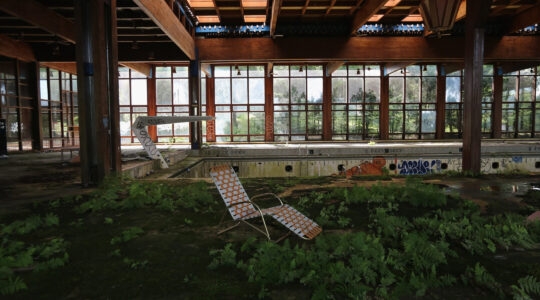One of the unintended highlights of this year’s Conversation — the annual Jewish Week-sponsored two-day retreat for a wide variety of Jewish leaders and future leaders from around the country — was the emerging friendship between two participants with seemingly little in common besides their names. Actually, their name.
You see, the small team that helps put together the list of about 55 participants each year had intended to invite David Ingber, the dynamic and popular rabbi of Romemu, a growing congregation on the Upper West Side. When his positive response arrived, though, several months ago, we were surprised to see that his registration form noted that besides living on the Upper West Side and being very interested in discussing why fewer Jews of his age were affiliating with Jewish life, he listed his profession as comedy and making videos of Major League baseball players.
Happy ending: David Ingber, left, and Rabbi David Ingber, at The Conversation last week.
We soon realized we had invited “the wrong” David Ingber.
A few days later, the “right” David Inbger, the rabbi, also registered to attend.
What to do? Before our team had a chance to discuss the situation, the “baseball David Ingber” e-mailed us to say that he had checked our website’s list of participants and realized we’d meant to invite the “Romemu David Ingber.” He said he would not be insulted if we told him he was disinvited, no hard feelings.
I couldn’t help thinking of the parallels to the famous Talmudic story of perhaps the most tragic case of mistaken identity in Jewish history. According to the Midrash, a wealthy man in first-century Jerusalem was making a party and asked his servant to invite the man’s friend, named Kamsa. By accident, the servant invited a man named Bar Kamsa, an enemy of the host, who showed up at the party and was asked by the host to leave.
Bar Kamsa, hoping to avoid public humiliation, offered to make peace with the host, and even offered to pay for the party if he was allowed to stay. But he was rebuffed and forced to leave. Angered over the incident, particularly over the fact that the rabbis in attendance did not come to his aid, he vowed revenge. He went to the Romans and told them the Jews were planning a revolt, which resulted in the siege of Jerusalem and the destruction of the Holy Temple.
A spectacularly disastrous example of Jew vs. Jew animosity.
For reasons far less dramatic — namely our planning team thought “the baseball David Ingber,” who is 30, and had written enthusiastically about his desire to attend, had much to contribute to the Conversation discussions — we re-invited him. We told him that while it was true he was invited by mistake, we definitely wanted him to come.
In the end, not only was he a particularly thoughtful and charming participant, but he and his namesake spent time together and played off each other’s distinctive talents. (At one point “the Romemu David Ingber” referred to the other David Ingber as “my rabbi.”) And after their story was made known to the other participants, the two were often seen posing together for photos.
It was a kind of Jew vs. Jew story in reverse, and one that underscored the unique quality of The Conversation that makes it so appealing to its participants — a safe space for reflective, off-the-record discussion with fellow Jews, most of whom they would otherwise never meet or get to know.
Sitting in a large circle last Tuesday at the end of the 48-hour retreat, I looked around the room at the other participants and marveled at how — strangers for the most part two days ago — we had bonded as a group, despite our diverse backgrounds. And we had been able to go deep in our discussions around the broad theme of “Being Jewish In America In the 21st Century.”
As one of the group observed, how refreshing that “we just spent two days questioning answers rather than answering questions.”
Among us were Jewish lay and professional leaders, rabbis from each of the streams, business people, journalists, social media experts, professors, gay activists and a best-selling author. We represented all ages, religious and political beliefs, and parts of the country. What we had in common was a willingness to hear other points of view and a keen interest in the Jewish enterprise, however we defined it, as well as a commitment to sustaining it at a time when its survival in this country is seen as threatened.
Now in its ninth year and set at the Pearlstone Conference Center on a lovely farm near Baltimore, The Conversation features no plenaries, panels or outside speakers. In fact there is no program. The participants themselves are the program. With Open Space facilitation, they are invited to propose topics for discussion and whoever wants to join them does so. The largest discussion at this year’s conference, held Oct. 13-15, had about 30 people taking part; others had as few as three or four.
Not surprisingly, much of the talk was dominated by reactions to the recent Pew report on American Jewish identity. (It was the topic of the session with 30 people.) And proof of the diversity among the participants was that some felt the report was a virtual death knell for the community while others found the results heartening.
Much, it seems, depends on whether you see your Jewish identity in religious or cultural terms. Those among the former pointed to the worrisome statistics about intermarriage and the growing numbers of Jews with “no religion,” while those among the latter took comfort in the overwhelming number of respondents who expressed pride in being Jewish and saw the increase in interfaith marriages as expanding the number of Jewish allies in the U.S.
(Noting the varied points of view, one participant referred to the Pew report as “demographic manna,” containing data that can affirm and nourish whatever opinions one has about the condition of American Jewry.)
There was surprisingly little talk of Israel this year. A number of discussions revolved around what is seen as broken in the U.S. Jewish community and in need of repair — synagogues, Hebrew schools, Jewish organizations. But as the participants became more comfortable with the process, and each other, the discussions turned more personal: What inspires you Jewishly? What is your vision of the Jewish future? What can be done for aging single women who want to have children? How does one maintain one’s Jewish identity in an overwhelmingly Christian environment in the Mississippi Delta?
Experience with The Conversation has shown that long after the specifics of the discussions fade from memory, the feeling of being connected to others with whom one has differing views stays on, and is still appreciated — especially at a time when much of our society, from Washington on down, has lost the art of civil discourse.
For me, I will cherish the words of gratitude from participants for the “gift” of The Conversation, and smile whenever I see a photo of the two David Ingbers, smiling, arm in arm and holding up their name tags.
The New York Jewish Week brings you the stories behind the headlines, keeping you connected to Jewish life in New York. Help sustain the reporting you trust by donating today.





